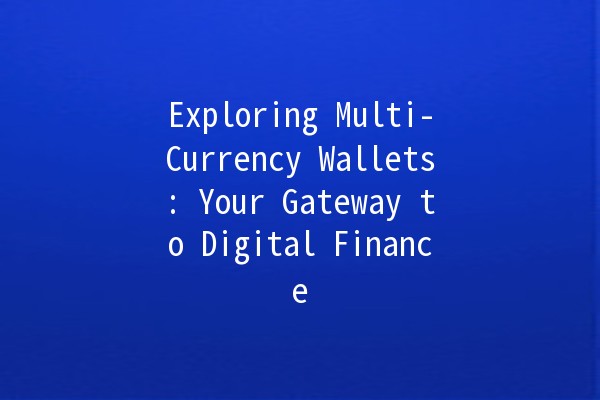




In the rapidly evolving world of cryptocurrency and digital finance, the ability to manage multiple currencies within a single platform is becoming increasingly vital. Whether you're an investor looking to diversify, a traveler hoping to avoid currency conversion fees, or simply a tech enthusiast eager to explore the vast potentials of blockchain technology, a multicurrency wallet can be your essential tool. This article delves into the specifics of multicurrency wallets, offering practical tips to enhance your productivity and engagement in this digital realm.

A multicurrency wallet is designed to store various types of cryptocurrencies in one place, simplifying the process of managing diverse digital assets. Unlike singlecurrency wallets that only support one type of cryptocurrency, multicurrency wallets allow users to hold, send, and receive several currencies at once. This feature is particularly appealing for traders, investors, and everyday users who want to keep their assets consolidated.
In this section, we’ll discuss the advantages of using a multicurrency wallet over traditional banking methods and singlecurrency wallets.
Multicurrency wallets often charge lower fees when transacting between supported currencies than traditional banking or exchange methods. This can result in significant savings, especially for frequent traders and users regularly exchanging currencies.
By consolidating various wallets into one, users can effortlessly switch between currencies and manage their investments without jumping between multiple platforms. The ease of access makes it userfriendly and saves time.
With a multicurrency wallet, users can maintain multiple cryptocurrencies without needing separate wallets for each one. This promotes diversification in digital asset investment, which is crucial for risk management.
Here are five practical tips to enhance your productivity and security while using a multicurrency wallet:
Not all multicurrency wallets are created equal. Spend time researching various wallets available in the market. Consider factors such as the number of currencies supported, fees, security features, and user reviews. For instance, wallets like Exodus and Coinbase Wallet are known for their extensive support and reliability.
Example: If you are primarily interested in trading altcoins, make sure your selected wallet supports those currencies to avoid limitations in your trading capabilities.
Security should always be a priority when managing cryptocurrencies. Enable 2FA on your wallet to add an additional layer of protection. This step can significantly reduce the risk of unauthorized access to your funds.
Example: Use apps like Google Authenticator to generate unique codes required during the login process.
Create backups of your wallet to prevent loss of access due to device failure or other unforeseen circumstances. Most wallets provide an option to export private keys or seed phrases, which you should store securely.
Example: Write down your seed phrase on paper and keep it in a safe place, away from prying eyes.
Cryptocurrency technology is everevolving. Make it a habit to stay informed about updates to both the currencies you own and the wallet you use. Frequent updates may contain new features, performance improvements, or crucial security patches.
Example: Subscribe to reputable cryptocurrency news outlets or follow official social media channels for announcement updates.
Many multicurrency wallets come equipped with builtin exchange functionalities. While this is convenient, always compare the rates and fees against external exchanges to ensure you’re getting the best deal.
Example: If your wallet offers a builtin swap for Bitcoin to Ethereum, check an exchange platform like Binance for better rates before proceeding.
Most multicurrency wallets support a wide range of cryptocurrencies, including Bitcoin, Ethereum, Litecoin, Ripple, and many more. The selection will depend on your chosen wallet, so it's essential to check the currency compatibility before starting.
While many reputable multicurrency wallets implement robust security measures, no wallet is entirely riskfree. It's crucial to choose a wallet with strong security protocols, enable features like 2FA, and regularly back up your wallet data. User responsibility plays a vital role in securing funds.
Yes, many multicurrency wallets offer mobile applications for both iOS and Android devices. This allows users to manage their assets conveniently and securely from anywhere.
Fees can vary widely among different wallets. Some wallets charge transaction fees when sending funds, while others may charge for currency swaps. Always review fee structures before selecting a wallet to understand how it may impact your transactions.
Whether you need to verify your identity (KYC process) depends on the wallet and the features you intend to use. Wallets that include exchange services often require identity verification, especially for large transactions.
Most multicurrency wallets have an intuitive interface that allows you to select the currencies you want to exchange. Simply navigate to the exchange feature, select the currencies, enter the amount, and complete the transaction. Be mindful of the exchange rates and fees involved.
With the rising popularity of cryptocurrencies, a multicurrency wallet serves as an essential tool for modern digital users. By embracing the tips and insights outlined in this article, you can navigate the world of digital finance with confidence and efficiency. Whether you're trading, investing, or simply exploring, the right wallet can significantly enhance your digital asset experience. Happy managing!